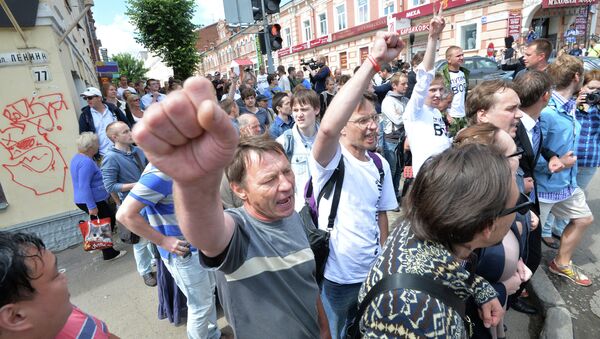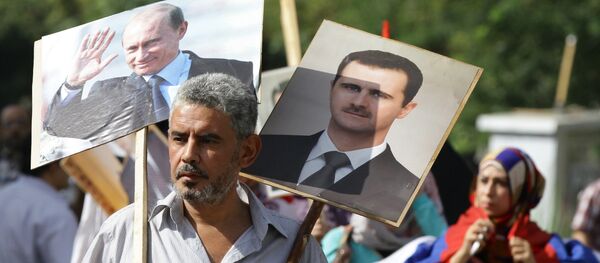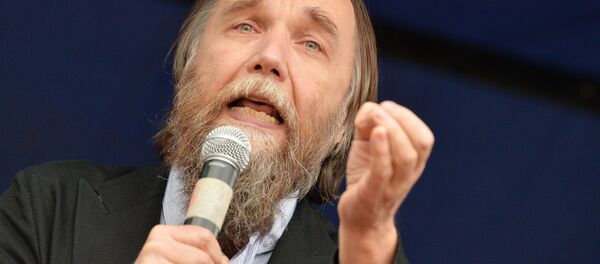In his piece, published in the Society page of the Russian news and analysis portal Svobodnaya Pressa, Babitskiy, a war reporter fired from RL/RFE after 25 years of service, explained how the collapse of communism and the chaos of the 1990s has effectively turned Russia into one of the most liberal nations in the world, in the Voltairean sense of the word.
The journalist recalled that in the early 1990s, "after a long period of unanimity imposed by the state, the Russian people were unceremoniously thrown into a world in which literally thousands of ideas competed with one another. In the course of over 20 years, however paradoxical it may seem, an understanding emerged that, in Russia, there are as many opinions as there are people –Communists with their red flags, pie-throwing National Bolsheviks, libertarians who fight for the right of the rich against the poor, anarchists, monarchists, politicized Buddhists, nationalists, etc."
"Actually," the journalist suggested, "it was the change of the social, rather than political structure, which taught societal tolerance. For instance, cities suffered the invasion of aggressively-oriented ethnic and territorial subcultures, whose presence in the urban space was previously limited by the system of registration [the infamous Soviet 'propiska' system]. With these artificial barriers collapsing, various groups rushed for the major cities, grabbing up for themselves the markets, businesses, and coming to lord over the weak-willed. Regional capitals, including Moscow and St. Petersburg, were subject to the severe embrace of guests from the provinces –people from the Caucasus region and the 'Lyubery' [the latter slang for groups of sport-enthusiasts turned racketeers who eventually evolved into criminal syndicates]."
"The lives of city residents, long coddled by the stability of the totalitarian order, were twisted and shifted inside a dangerous and rapidly moving kaleidoscope, where ethnic groups, religions, lower class subcultures, and not just ideas, were lumped together, while intellectual swindlers and financial fraudsters from occultists to 'MMM' [a Ponzi scheme] came to operate in full force."
"Out of this pitch darkness of indistinction," Babitskiy writes, "the people of Russia emerged completely changed. They climbed out of the chaos as nearly perfect liberals, respecting the freedom of their neighbor…They showed a preparedness to tolerate all their neighbors, with only one condition: that they do not break the law or threaten someone else's personal safety."
"As a result, in the new Russia, having settled from the 'wild' 90s, there is a place for everyone –Zyuganov, Zhirinovsky, Kadyrov, Patriarch Kirill, the meditative practices of Tibet, sun-worshipers, the Seraphim of Sarov, Aleister Crowley, Pushkin and Dontsova. Of course, crime and terrorism in their most primordial forms, from the Lubery to MMM and the Wahhabis, had to be removed."
"Yes, the government continued to act less than wisely and clumsily at times," Babitskiy admits, trying to impose bans on some sources of pluralism and to take control of others, "but this did not change the essence of the matter. Russian society proved to so diverse, that only a person who respects others peoples' freedom, and the right of others to think differently, to believe otherwise, to walk and breathe differently, can live here."
Russian Liberals Often Don't Live Up to Their Namesake
According to Babitskiy, the Russian liberal political class –the so-called democratic camp which played such an important role in the collapse of the Soviet Union, and a decisive role in attempts to build a politically and economically liberal Russia in the 1990s, has proven that it has very little to do with the core principal of liberalism – Voltaire's idea that 'I disapprove of what you say, but will defend to the death your right to say it'.
"The Russian pseudo-liberal," Babitskiy argues, "believes that the 86% of people who support Putin are defective. He speaks of Russia as 'this country', and frankly does not understand that when he talks about Russians' so-called genetic predisposition for slavery, he is showing himself as an ideological heir to the Nazis. He proceeds from a perceived moral superiority of his narrow, sectarian circle, which, in his view, is the only one which has the right to broadcast in the name of freedom."
To prove his point, Babitskiy recalled a recent incident on a Ukrainian talk show, where liberal journalist Matvey Ganapolsky, "live on television, told a caller to go where the sun don't shine, calling him a wretch and swine, all because the man expressed his opinion that only Putin could save Ukraine. Sure, it's not a very popular opinion in liberal circles, but it's only an opinion. Refute it," Babitskiy suggested.
The journalist argues that Russian pseudo-liberals have effectively proven themselves almost completely incapable of recognizing the right of their opponents to hold a viewpoint that does not match their own, to treat them with respect and dignity. In this way, Babitskiy argues, pseudo-liberals have "drawn from the rich experience of seventy years of Soviet practice to eliminate any polyphony, from a huge assortment of points proving the total rightness of their side."
Ultimately, Babitskiy believes that in the face of Russian liberals, the worst qualities of the Soviet system "have paradoxically and mischievously had their revenge, finding new life among the liberal [ideational] environment, reinterpreted and adapted to the needs of our time by the same people who once publically disowned everything Soviet, who declared themselves to be the forerunners of non-Soviet freedom."






